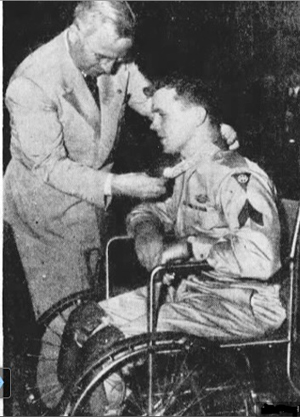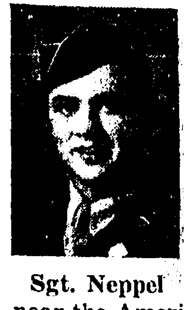Sgt. Neppel To Receive Medal From Truman
(See Story on Page 9, 2nd Section)
Sgt. Ralph G. Neppel, 21, Glidden, second Iowa soldier to win the Congressional Medal of Honor and live, will go to Washington, D.C., August 21 to receive the medal from President Truman, it was learned here today.
Despite loss of both legs below the knees, the Carroll county soldier is enjoying life at his family home. He has gained 20 to 30 pounds and thinks there is nothing like his mother’s home cooking on the farm.
Modestly disclaiming the title of “hero,” Sgt. Neppel said, “heroes don’t live.” But he added, “It’s great to be alive and home again.” He arrived home August 3 for 30 days leave.
Sgt. Ralph Neppel, Glidden, Wins Congressional Medal of Honor
Fifth Iowa Soldier to Get Highest Tribute of Nation
Heroic Glidden Machine-Gunner Killed 20 Germans, Fought Off Tank After Leg Blown Off by Artillery Shell
WASHINGTON, D.C. (AP)—Sgt. Ralph G. Neppel, one-time Iowa farmer, won the Congressional Medal of Honor for mowing down 20 German infantrymen counter-attacking with the help of a tank.
A shell from the tank blew off Neppel’s left leg, but he kept on firing until the last German soldier was dead and the tank had retreated. (His right leg later was amputated.)
The War Department, announcing the award today, said Neppel now is a patient in McCloskey General hospital, Temple, Tex. He is a resident of Glidden, Iowa.
The action took place last December 14 near the American-held German village of Birgel where Neppel’s squad, part of the 83rd (Ohio) division was defending approaches to the town.
When the Germans launched their counter-attack, Neppel waited until they were within 100 yards of his machine gun. Then he raked the infantrymen, killing several and forcing others in behind the tank. The tank pressed on and at point-blank range fired a shell into Neppel’s emplacement, wounding every man.
Neppel was blown 10 yards from his gun. His right leg was shattered and he suffered other wounds.
But he dragged himself back to the gun and, resting on his elbows, killed the remainder of the German infantrymen. The tank retreated.
Neppel, a native of Willey, Ia., entered the army in March, 1943. His mother, Mrs. Rose M. Neppel, lives on a farm at Glidden.
Neppel was the fifth Iowan to receive the Medal of Honor for “extraordinary heroism in action” during World War II. Sgt. Herschel F. Briles of Colfax was so honored last month.
Posthumous awards have been made to Lieutenant Dale E. Christensen, Gray; Captain Darrel R. Lindsey, Fort Dodge; and Pfc. John F. Thorson, Armstrong.
(Sgt. Neppel is now home on 30-day leave, visiting his family home. He is in the best of spirits and apparently well on the way to recovery.)
Source: Carroll Times Herald, August 15, 1945 (photo included)
![]()

Seated in a wheelchair, Sgt. Ralph G. Neppel, 21, of Glidden, Ia., receives the Medal of Honor from President Truman
2 Iowans Presented Medals by Truman
26 Others Receive Highest Awards
Washington, D.C. (U.P.) President Truman personally welcomed 28 American fighting men into the nation's hall of heroes Thursday in the largest mass ceremony of its kind.
Two of the award winners are from Iowa: Sgt. Ralph G. Neppel, of Glidden, who lost both legs and Staff Sgt Hershel F. Briles of Colfax.
In the crowded east room of the White House, the chief executive solemnly fastened the Medal of Honor, the nation's supreme award for valor, about the necks of 24 heroes from the war in Europe and four from the Pacific battle fronts.
More than 300 mothers, fathers, brothers, sisters and sweethearts - many of them awed and noticeably nervous - sat quietly in the chandeliered east room of the executive mansion as the World War II heroes stepped up to the president one by one, saluted and stood stiffly at attention.
All Had Waited
(Two of the honored men did not stand with the others -- they could not walk and were in wheelchairs. Another was blind. Most of the rest had had to wait until Thursday for their most memorable day of their lives because of wounds suffered in battle. Many are crippled for life.)
After the last medal was awarded, the president stepped to a microphone in the east room and made a short speech.
"When leadership is required, no matter what the emergency, " he asserted,"it comes to the top in the young men of America. These men, who loved peace, were able to adjust themselves to the needs of war and turned out to be leaders."
All of the heroes were members of the army. Their 28 awards bring to 196 the number of Medals of Honor awarded to army personnel since World War II began.
Soft Music
A part of the United States army band played softly in the White House lobby as the heroes and their families were ushered into the east room. Mrs. Truman greeted many of them personally as they entered. The soft strains of "Hail to the Chief" heralded the entrance of the president and the simple ceremony began.
Mr. Truman smiled at the crowd, then looked respectfully at the 28 khaki-clad men to whom he was to award the medal which he, himself, has said would be a better possession than the presidency of the United States.
[excerpt]
As a leader of a platoon of tank destroyers of the 899th tank destroyer battalion, 47th regiment of the 9th division, Sergeant Briles, 31, twice entered the hulls of burning tank destroyers to rescue trapped comrades last Nov. 20 and 21 near Scherpenseel, Germany
Although ill before the fighting began, Briles refused to leave his position. During the scrap he alone took 55 German prisoners
Sergeant Neppel, 21, as a machine gun squad leader, calmly ignored a charging tank and wiped out 20 Germans who were assaulting his position near Birgel, Germany, last December 14. The fighting member of Co. M, 329th infantry regiment of the 83rd (Ohio) division, was blasted from his gun position by a high velocity shell from the tank.
A fragment severed his right leg below the knee, with the enemy closing in only 30 yards away, he dragged himself to his gun, killed the remaining Germans, and without the support of riflemen force the tank to withdraw.
T/4 Arthur O. Beyer, 36, Ogema, Minn, was an artilleryman by assignment but was fighting as an infantryman last Jan. 15 in Belgium when he stalked a string of German foxholes, killing eight Germans and capturing 18 others. He was a gunner of Co. C, 603rd tank destroyer battalion, 6th armored division.
Source: The Des Moines Tribune, August 23, 1945 (photo included)
***Further Research:
Ralph George Neppel was born Oct. 31, 1923 to Maximilian “Max” and Rose Mary Werner Neppel. He died Jan. 27, 1987 and is buried in Holy Family Cemetery, Lidderdale, IA.
Source: ancestry.com
![]()


